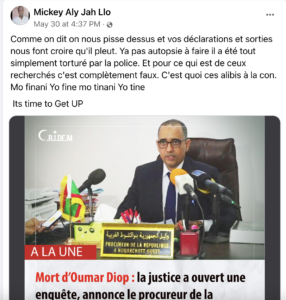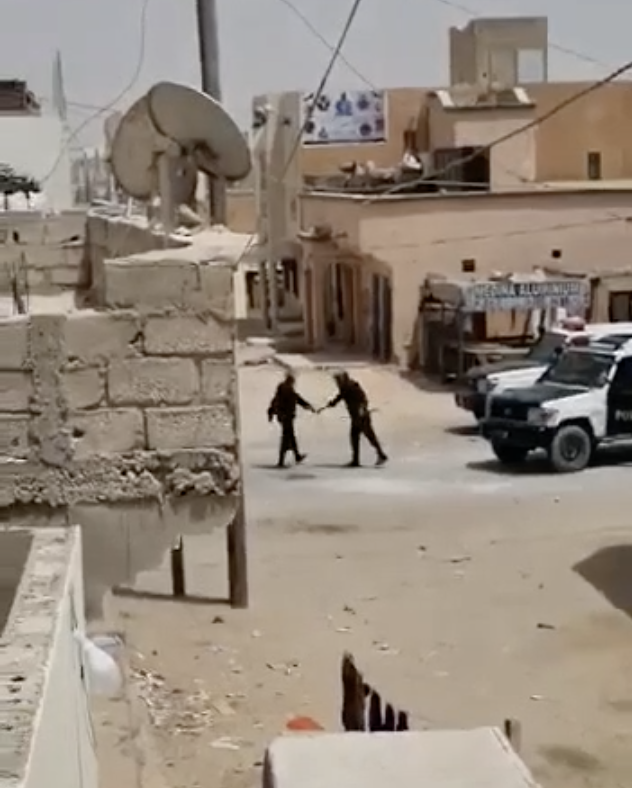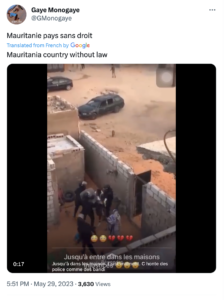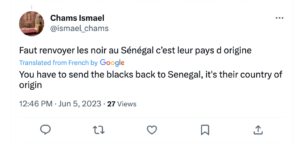[content warning – murder, violence, racism, graphic images and videos (linked)]
Skip to timeline of current abuses
The Mauritanian government and civil society is controlled by “White Moors” who have systematically tried to repress, enslave, and extinguish the country’s Black citizens. It is an absolute apartheid regime. Their goal is to make Mauritania into an “Arab state” by reducing the number of Black people in the country—despite the fact that their families have lived on the land for centuries—and controlling the rest.
Through a combination of gaslighting, denial, and brute force—and a lack of international media scrutiny—the government has been able to hide its violence in plain sight.
The success of the Mauritanian government’s disinformation campaign is undeniable. The U.S. State Department praised Mauritania’s 2019 presidential election, calling it “the first democratic transition of power between two elected presidents since the country’s independence in 1960.” The reality was quite different, the outcome pre-ordained.
Before votes could be counted, the “victory” party for Mohamed Ould Cheikh Ghazouani was underway and military tanks roamed the streets of Nouakchott to intimidate potential protesters. The government shut off the Internet nationwide and arrested opposition leaders. Ghazouani was the hand-picked successor of former President Mohamed Ould Abdel Aziz, who is now facing criminal corruption charges for his actions while president.
In 2022, the allegations of civil rights defenders were validated when the voters list used in the 2019 elections was discarded, and a new one created to “increase public confidence in its accuracy, comprehensiveness, and inclusiveness” in the words of USAID and the International Foundation for Electoral Systems.
The same corruption and repression of dissent is happening now—but with more violence—and the International Community must pay attention. After recent parliamentary elections, internationally acclaimed human rights defender Biram Dah Abeid was arrested for speaking out about the corrupt process. Other critics have been arrested, and police are beating and even murdering protestors.
New instances of police brutality and government repression have spawned a wave of protests in cities across Mauritania. The government responded with escalating violence and another Internet blackout. One of the first police killings that led to mass protests was the torture of Oumar Diop, who had been planning to seek asylum in the United States.
This timeline shows the extreme challenges facing Black Mauritanians as they protest the brutal Mauritanian government, and the dangers faced by those who expose the unjust regime—whether by protesting or fleeing the country to seek asylum.
The repression Black Mauritanians experience at the hands of their own government rationalizes the asylum claims made by those risking their lives to go to the US and Europe; the need for safe migration pathways; and the urgency of designating Temporary Protected Status for Mauritania.
Recently, a ninth man from Mauritania died on his journey to the United States, suffering cardiac arrest on an airplane. Diaspora leader Abdoul Mbow wrote about the decisions Mauritanians are forced to make in the Columbus Dispatch:
Today, the Mauritanian government has new ways to erase Black people.
They refuse to issue identity documents, so that we don’t exist in official records. Without IDs, we also can’t travel or get jobs. They cancel our ways of communicating so that we have no mobility in an all-Arabic society. They still take our land, put us in jail, and beat us.
This is why some people take this risk. What future is there, when you have no present?
Many other Black Mauritanians have died trying to reach safety in Europe. These deaths could be prevented if the International Community acknowledged the real situation, developed safe migration options, and forced the Mauritanian government to end apartheid. Read on to learn about the latest incidents experienced by Black people in Mauritania.
Timeline: Anti-Black Violence in Mauritania, May-August 2023
May 13: Municipal and regional elections were held throughout Mauritania. On election day, polling stations were relocated at the last minute, causing confusion; voter verification was not consistently completed, such that one person could vote multiple times; and opposition candidate representatives were blocked from observing at polling stations. A spokesman for the CENI, the national independent electoral commission, acknowledged a delay in rolling out ballots, but denied any violation was “likely to influence the results of the ballot.”
May 21: First-round election results were released, with the ruling El Insaf party of President Mohamed Our Cheikh El Ghazouani “winning” by a large margin. Human rights defenders denounced fraud in the proceedings.
May 24: Internationally acclaimed civil rights leader Biram Dah Abeid was arrested by the Mauritanian government for speaking out about the corrupt electoral process. Other critics were arrested, and police began beating protestors who rose to their defense.
Abeid has been arrested many times by the Mauritanian government for his anti-slavery and civil rights activism. In 2018, the government arrested Abeid to prevent him from running for parliament. He had also been speaking out about the incarceration of people in Mauritania who were deported by the U.S. A peaceful protest calling for his release in 2018 was met with state violence. Front Line Defenders reported that twelve human rights activists were attacked by Mauritanian police. CRIDEM shared horrific photos of the victims of police brutality, including Dah Abeid’s wife [strict content warning].
May 27: A second round of elections for the National Assembly were held. Official “results” again held that the El Insaf party officially won a majority in the National Assembly. General Mohamed Ould Meguett was deemed president of the legislative body, despite his well-known role in the 1989 genocide, documented in “L’Enfer D’Inal” by torture camp survivor Mahamadou Sy. This book was written in French and published in 2000; an English translation is set for publication in 2023.
Civil rights leaders had been warning that Meguett would be installed through Mauritania’s fake electoral process, and people of all races who remember the genocide in their bones and families decried the puppetry.
Protests continued. Police brutally beat Black protestors and kidnapped some off the streets—including young men and women. Their goal was to justify their violence as attempting to control young rabble rousers and Black “foreigners” from Senegal and Mali. This is an eerie echo of the justification for the late 1980s/early 1990s mass deportation and genocide, which in reality targeted Black Mauritanians.
In reality, the government is on a spree of violence with only one common denominator—the color of the victims’ skin. In this video, police throw a grenade into a home, not knowing or caring how many generations of family members were present. When the grenade went off, people began to wail. The officers gave each other a high five and walked away.
May 29: Oumar Diop was in his car on the side of the road when police attempted to rob him of his money. Diop had recently sold a car in order to finance a trip to the United States, where he intended to seek asylum. When Diop refused to give the police his money, they took him to the Sebkha police station and electrocuted him until he died.
The government attempted to write a new narrative about his death, saying that Mr. Diop had been violent and was intoxicated. This was merely a way to cover-up their actions. In a news interview, a friend who was with Diop when he was taken disputed the government narrative and said Diop was someone who didn’t cause problems (full translation here.) Diop’s murder left a bereaved pregnant wife and small children, as well as a family and community.
The police murder of human rights activist Souvi Ould Jibril Ould Cheine, earlier this year, was carried out in the same way as Diop’s.
May 30: Photos of Diop and news of his treatment traveled around the world. More people took to the streets to protest, and expressed their anger in other ways. Police responded with tear gas and beatings. Many videos showing police violence against young men, even entering the courtyards of their homes and dragging them out, circulated on social media. Deputy Ahmed Jiddou Ould Zeine called on the government to close the country’s borders. It did so, and shut off cellular Internet access to prevent news of the atrocities from continuing to circulate around the world.
The Mauritanian government has often interfered with internet access in order to silence dissent, including after the controversial 2019 presidential election, at which time they also arrested human rights leaders like Samba Thiam. In March 2023, when another such incident occurred, Felicia Anthonio with Access Now explained: “In times of heightened social tension and unrest, internet access is more of a lifeline for people than ever. Stopping people from communicating with each other is unjustified and disproportionate; the government should change course immediately and restore access for all people.”
This video of police entering private property and attacking young Black people is particularly difficult to watch. But experiencing it would be infinitely worse. Diaspora members are circulating it and others widely, but so far no English-language media outlets have covered the violence. This person shared the video on Twitter, commenting that Mauritania is a lawless country.
The response from an apartheid-denier was as expected as it was cruel.
When they tell you who they are, believe them.
Also in late May 2023, Families reported disappearances of loved ones taken by the police. While many names of the taken are not known, we do know that a high-profile activist, Mamadou “Mickey” Aly Diallo, was arrested along with another influencer, Illa. Mickey had changed his Facebook profile photo to that of Oumar Diop after the man’s murder. His last post, published at 4:37pm on May 30, criticized the Nouakchott-West prosecutor Ahmed Abdallahi Moustapha and the government’s false narrative about Diop’s death. He wrote:

Facebook post about Oumar Diop’s murder by police, and subsequent cover up.
Translation: “As they say we are pissed on, and your declarations and exits make us believe that it is raining. There is no autopsy to do, he was simply tortured by the police. And as for those sought, it is completely false. What are these bullshit alibis? Those who were asleep need to wake up and those unaware need to know. It’s time to Get UP.”
May 31: Another young man, Mohamed Lemine, was shot and killed by police during a peaceful protest in the southern city of Boghé. Mauritanian Interior Minister Mohamed Ahmed Ould tried to discredit the protestors and blame Lemine for his own death, stating that the protesters were simply “groups of minors who take advantage of these events to cause damage to public and private property.”
This video shows a group of young people carrying Lemine’s body after he was shot by police. Here, his body is laid out in public; a photo of the same scene has been circulating around the world.
June 1: Police continued what president of the Mauritanian Association for Human Rights, Fatimata M’baye, described as a “manhunt”—rampant violence against young people and other dissenters. Military trucks roamed Black neighborhoods of Nouakchott. Any Black person found on the street could be a target for arrest and/or beating—including women. Witnesses reported police assaults on young people in Sebkha, Arafat, Riyadh and El Mina.
Mauritanian police “deported” people they identified as “foreigners,” entering their homes and taking them by force. Among those sent across the river to Senegal were Malians, people from Senegal, and Mauritanians. “Expelling foreigners” was the same ruse used in 1989, when the government began expelling thousands of Black Mauritanian people, taking their homes and land.
June 2: Internet access remained blocked, but videos, photos, and news of prior government atrocities, and some new examples, continued to spread internationally. Videos on social media show extreme police violence against protestors in the aftermath of the murders of Oumar Diop and Mohamed Lemine. This woman describes her torture by police, which resulted in breaking her arm.
June 15: The State Department officially upgraded Mauritania to Tier 2 in its latest annual “Trafficking in Persons” assessment. Activists were incredulous that the U.S. State Department would give the Mauritanian government this undeserved credit Mauritania is a country where tens of thousands of people—and by some estimates, hundreds of thousands—are being forced to work as slaves today. Right now. In 2023. The fact that the government identified trafficking victims for the first time in five years, and convicted six traffickers in one year, is unacceptable—not impressive.
June 21: The International Press Institute blasted Mauritania for disconnecting mobile Internet in May following the police murder of Oumar Diop. The wrote: “Authorities reportedly justified the shutdown as a way to hinder communication among criminals. This was the second time that Mauritania has shutdown the internet this year.” But this journalist who spoke anonymously gave the true story. He told IPI that “scuffles between the demonstrators and the police had been widely relayed across the country with live broadcasts. This gave a large echo to the protests. Footage of the beatings and the remains of the two victims were widely shared on social networks, along with calls to demonstrate. The authorities, to stop the movement, cut off the net.”
July 18: A Black female high school student was arrested and charged with blasphemy due to a paper she submitted for school, which allegedly maligned the Prophet. President Ghazouani asked the Mauritanian Council of Islamic Scholars to review the penalty for blasphemy—which is death—and issue a fatwa (non-binding legal opinion). The Council reaffirmed that the penalty for blasphemy is death, and even if the subject were to exhibit remorse, there is no defense. The young woman remains in pre-trial detention.
August 18: Senalioune reports that Mauritanian Imams and Ulemas are demanding that the girl be executed.
The Ohio Immigrant Alliance compiled this timeline from source material contributed by many different people and organizations. Contact admin@ohioimmigrant.org with questions or to schedule an interview.



